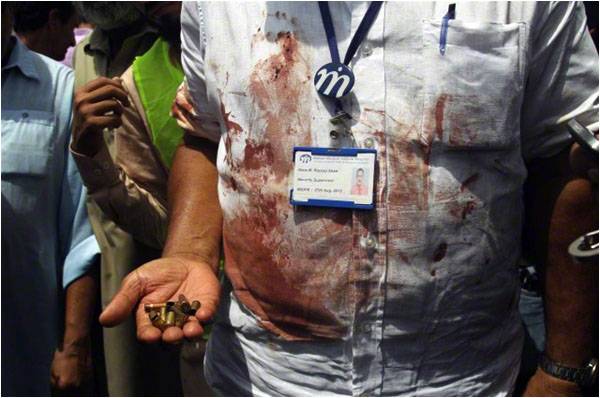
Away from the maddening rush of Karachi, the Al Azhar Garden, a housing colony located in KDA Scheme 33, is an architectural masterpiece with every building and structure reflecting traditional Gujrati heritage.
It was built by the Aga Khan Foundation a few years ago, as a low income housing society for the Ismaili community. From the Evershine Complex in Gulshan-e-Iqbal to the Garden in the old city area, the closely-knit community has lived this way since independence. They mind their own business, go about their daily routine and stay away from confrontational discourse.
Even though Ismailis have come under attack before, what happened to the residents of Al Azhar Garden on Wednesday morning is unparalleled in its brutality, police officers say.
Like any other day, dozens of men, women and children boarded a community bus, which, at just Rs20 per seat, works as a cheap mode of transportation for those heading to work or to see relatives in other parts of the city.
Beyond the walls of the colony is inhabited area for miles all around. A few minutes after the bus had left at 9am, it was stopped near Saforah Chowrangi by at least six armed men.
“We are not sure but these men could have been wearing police uniform,” said an investigator at the site where dirt road remained stained with blood hours after the attack. “But this was done by professionals. There should be no doubt about it.”
According to police, the men boarded the bus and shot dead more than 40 men and women one by one. Many of them were shot in the head. “The terrorists walked down the aisle shooting and killing them. All of it was done very calmly. Not a single windowpane has been shattered. No bullet penetrated through the body of the vehicle… it was done by solid professionals.”
Dozens of pamphlets signed by the ISIS, apparently left behind by the attackers, at the site of attack has complicated the situation for security officials who have tried to downplay the organization’s threat before.
At Memon Hospital, which the bus was driven to with all the bodies inside, the relatives of the dead were inconsolable – the stairs and floor covered in blood and young men stopping journalists from going inside.
“Why would they do such a thing to us? We cause no harm to anyone,” asked a medical student belonging to the community.
Back at the colony, children returning from schools were finding it hard to understand what had happened as mourns and cries came from the apartments.
The incident brought the performance of security forces under the spotlight. And MQM leaders were quick to criticize police and Sindh Rangers.
“The only criminals they see are at Nine Zero,” said Waseem Akhtar, a veteran MQM leader, citing the recent raid at party’s head office. “Our security forces have failed miserably in controlling the situation.”
It was built by the Aga Khan Foundation a few years ago, as a low income housing society for the Ismaili community. From the Evershine Complex in Gulshan-e-Iqbal to the Garden in the old city area, the closely-knit community has lived this way since independence. They mind their own business, go about their daily routine and stay away from confrontational discourse.
Even though Ismailis have come under attack before, what happened to the residents of Al Azhar Garden on Wednesday morning is unparalleled in its brutality, police officers say.
Like any other day, dozens of men, women and children boarded a community bus, which, at just Rs20 per seat, works as a cheap mode of transportation for those heading to work or to see relatives in other parts of the city.
Beyond the walls of the colony is inhabited area for miles all around. A few minutes after the bus had left at 9am, it was stopped near Saforah Chowrangi by at least six armed men.
“We are not sure but these men could have been wearing police uniform,” said an investigator at the site where dirt road remained stained with blood hours after the attack. “But this was done by professionals. There should be no doubt about it.”
According to police, the men boarded the bus and shot dead more than 40 men and women one by one. Many of them were shot in the head. “The terrorists walked down the aisle shooting and killing them. All of it was done very calmly. Not a single windowpane has been shattered. No bullet penetrated through the body of the vehicle… it was done by solid professionals.”
Dozens of pamphlets signed by the ISIS, apparently left behind by the attackers, at the site of attack has complicated the situation for security officials who have tried to downplay the organization’s threat before.
They walked down the aisle shooting and killing them one by one
At Memon Hospital, which the bus was driven to with all the bodies inside, the relatives of the dead were inconsolable – the stairs and floor covered in blood and young men stopping journalists from going inside.
“Why would they do such a thing to us? We cause no harm to anyone,” asked a medical student belonging to the community.
Back at the colony, children returning from schools were finding it hard to understand what had happened as mourns and cries came from the apartments.
The incident brought the performance of security forces under the spotlight. And MQM leaders were quick to criticize police and Sindh Rangers.
“The only criminals they see are at Nine Zero,” said Waseem Akhtar, a veteran MQM leader, citing the recent raid at party’s head office. “Our security forces have failed miserably in controlling the situation.”

